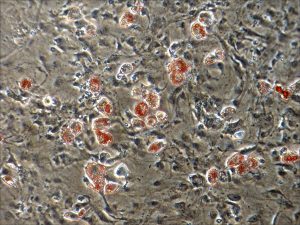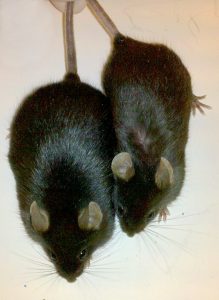Can an Oil Spill Make Your Genes Fat?
– January 14, 2013
Obesity and other metabolic diseases are major global health issues that are generally thought to be determined by family genes. However, a growing body of science on epigenetics (heritable changes in gene function that do not involve changes in gene/DNA sequence) indicates that the environment can change trait development at the fetal stage and the change can be carried from parent to offspring.
To understand potential long-term health impacts from the Deepwater Horizon oil spill on gene function aberrations, scientists are studying and identifying obesogens – chemicals that alter cells to favor weight gain – likely found in the oil and dispersant mixtures.
This is a curious turn of events in science since the proposed inheritance of acquired traits via environmental forces or “soft inheritance” had been unequivocally rejected until recently. . .so, “soft inheritance” must now be reconsidered , at least in part, since environmental exposures can shift not only traits within a lifetime but across generations! – Dr. Demetri D. Spyropoulos
With a three-year grant from the Gulf of Mexico Research Initiative, Drs. Demetri D. Spyropoulos, Satomi Kohno, John E. Baatz, and Louis J. Guillette with the Medical University of South Carolina are developing an in vitro or “test tube” model for identifying components in oil and dispersants that may influence long-term health and provide a framework to guide future oil spill contingency plans (such as the design of safer dispersants & dispersants that break down obesogens in oil). Their approach will go beyond acute toxicity studies and look at oil and dispersant mixtures impact on fetal origins of adult diseases, such as obesity.
Dr. Spyropoulos explains the connection between environmental impacts and genetic pre-disposition to obesity: “Genes control the body plan: what goes where and in what amounts, giving each person their own distinctive appearance, abilities, and mannerisms. Since the majority of cells’ fates are determined in the fetus, stem cells are likely to be very sensitive to environmental exposures that change gene activities, especially those that control the body plan. Endocrine disruptors are a major category of environmental pollutants that interfere with the body’s hormonal system. Endocrine disruptors such as obesogens are likely contributors to the obesity epidemic.”
Although assessed throughout life, early errors in the body plan and cell identities can ‘set the trajectory’ for life-long and trans-generational health – Dr. Demetri D. Spyropoulos
Researchers will employ new stem cell technology for rapid, reliable, and inexpensive tests to identify obesogens in species-specific stem cells (terrestrial, marine, and estuarine). Dr. Spyropoulos and his team have already generated species-specific stem cells, developed results on the formation of fatty tissue that distinguish marine (pygmy sperm whale) and terrestrial mammals (pig, mouse), and generated results showing impacts of endocrine disruptors on mouse and estuarine animal (American alligator) models. For this project, researchers are focusing on the formation of fat stem cells because they are a central feature of a number of major human health issues such as obesity, type II diabetes, cardiovascular diseases, and reproductive disorders. The species-specific stem cells will act as sensitive surrogates for fetal development and for understanding the impact of oil and dispersant mixtures on long-term health.
This study also will address impacts on logistically distinct oil spill contingency plans. For example, almost all marine Area Contingency Plans mandated by the Oil Pollution Act of 1990 (OPA 90) include pre-approval for use of dispersants over 5 km offshore and 10 m deep, but with no similar emergency decision-making protocols in place for coastal/estuarine regions.
Knowing which molecules from the oil and dispersant mixtures are harmful will help researchers selectively target their efforts to break them down and reduce negative long-term health impacts.
This research is made possible by a grant from BP/The Gulf of Mexico Research Initiative. The GoMRI is a 10-year, $500 million independent research program established by an agreement between BP and the Gulf of Mexico Alliance to study the effects of the Deepwater Horizon incident and the potential associated impact of this and similar incidents on the environment and public health.
© Copyright 2010- 2017 Gulf of Mexico Research Initiative (GoMRI) – All Rights Reserved. Redistribution is encouraged with acknowledgement to the Gulf of Mexico Research Initiative (GoMRI). Please credit images and/or videos as done in each article. Questions? Contact web-content editor Nilde “Maggie” Dannreuther, Northern Gulf Institute, Mississippi State University (maggied@ngi.msstate.edu).







